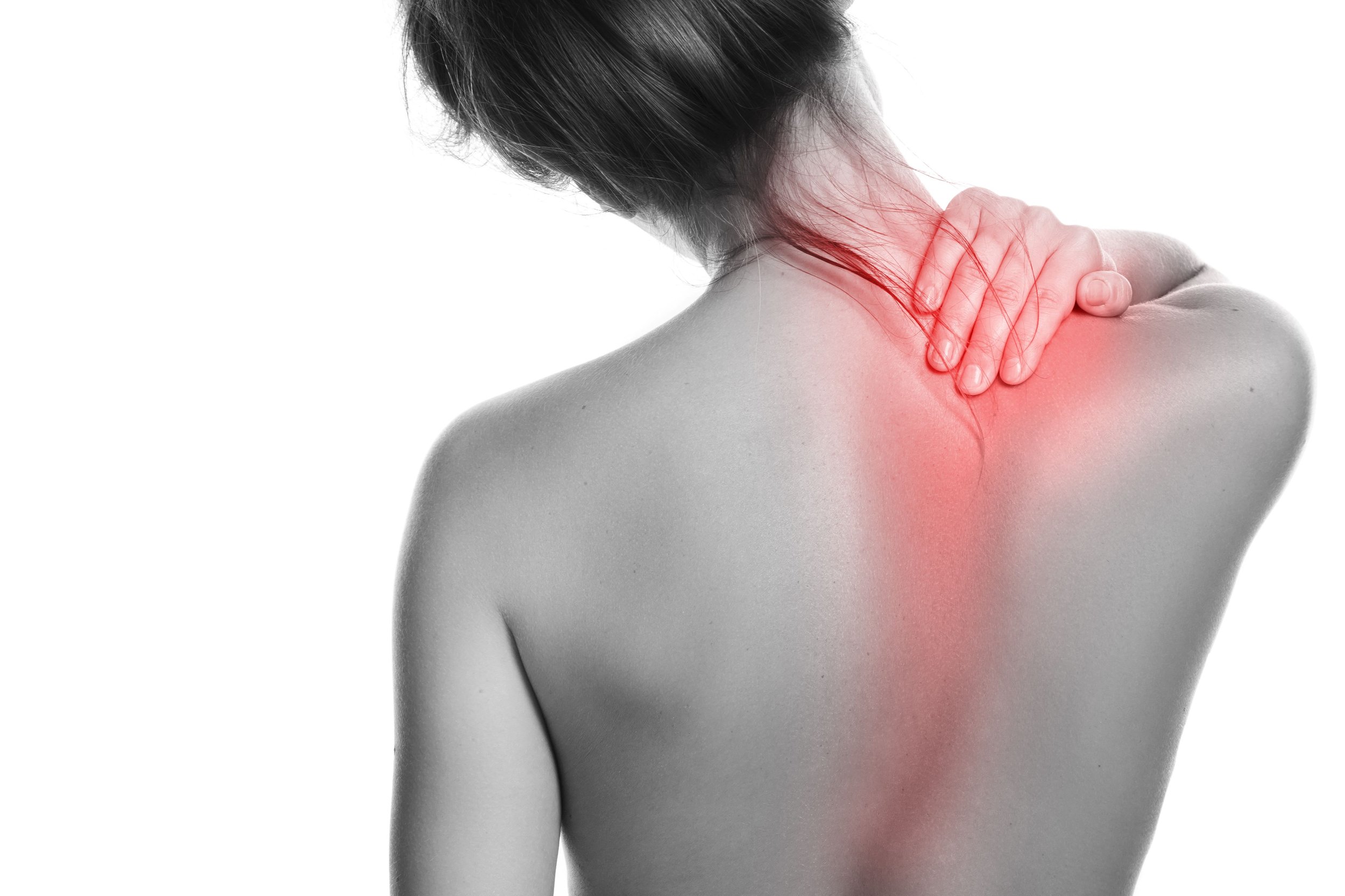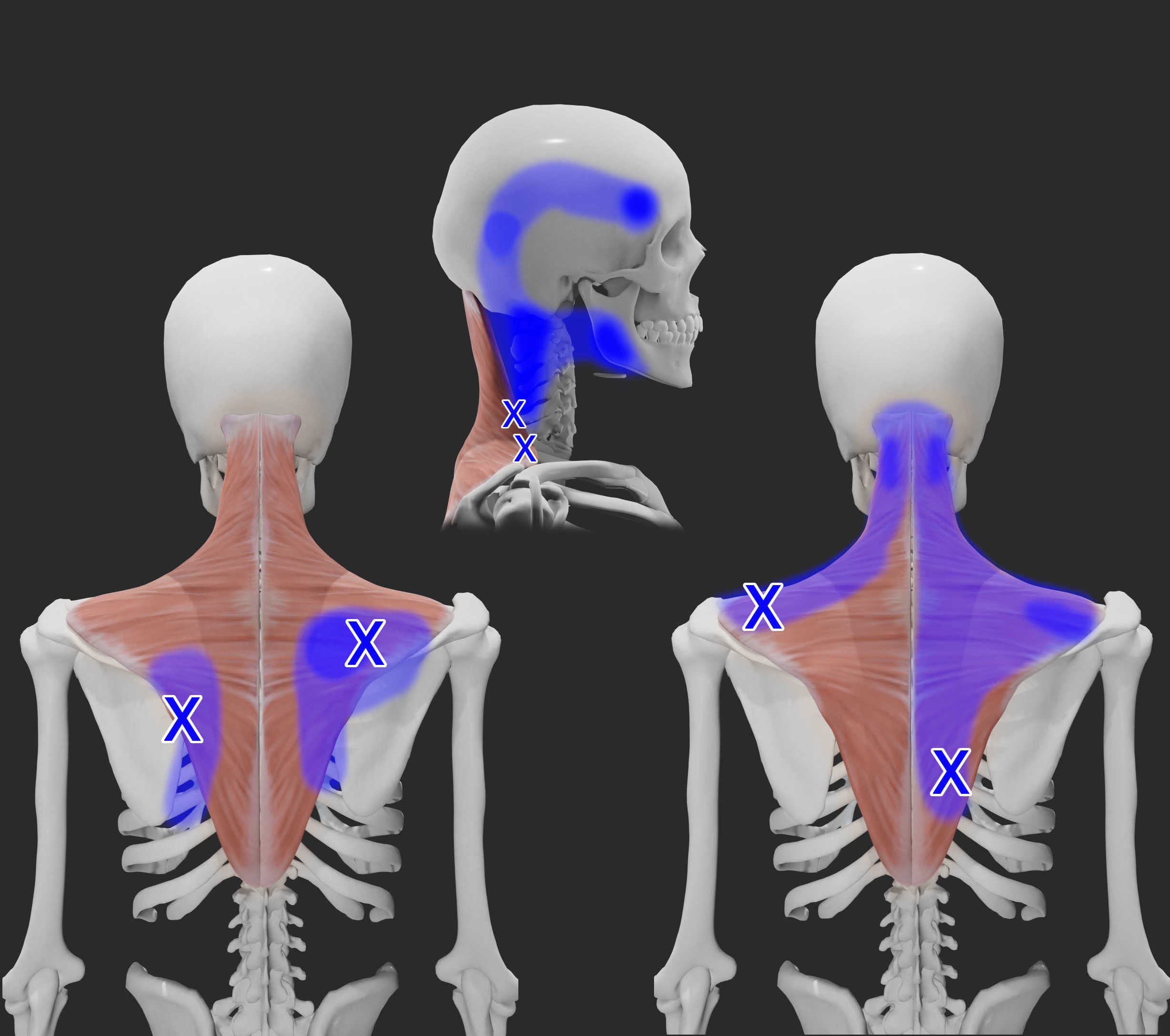Acupuncture for Trapezius Trigger Points
A person with upper trapezius muscle pain
How to Get Relief from Trapezius Muscle Pain?
Do you experience pain in the back of your shoulder, neck, or have tension headaches? Are you struggling with mid-thoracic or upper thoracic back pain? Read on to learn about trapezius trigger points and why you should consider treating them with acupuncture and dry needling.
What is the Trapezius Muscle?
The trapezius muscle is a large, triangular muscle that runs from the base of the skull to the middle of the back, and from the spine to the shoulder blade. It is divided into three parts: the upper (upper trap), middle (middle trap), and lower (lower trap) fibers. This muscle is involved in many everyday movements such as shrugging the shoulders, moving the arms and head, and holding objects. It also helps to stabilize the shoulder joint and is active during activities such as lifting, pushing, and pulling.
Trapezius Muscle Actions
Upper fibers: Extend head and neck, laterally flex head/neck to the same side, rotate head/neck to the opposite side, elevate and upwardly rotate the scapula.
Middle fibers: Adduct and stabilize the scapula.
Lower fibers: Depress and upwardly rotate the scapula.
Trapezius Synergists and Antagonists
Trapezius Synergists: Pectoralis major and minor, Subclavius, Serratus anterior, Latissimus dorsi, Rhomboid major and minor, Levator scapulae, and SCM.
Trapezius Antagonists: Deltoid, Supraspinatus, Infraspinatus, Teres major and minor, Subscapularis.
Common Indications for Trapezius Trigger Points
Back of Shoulder Pain
Mid-Thoracic Back Pain
Upper Thoracic Back Pain
Back of Head Pain
Back of Neck Pain
Cheek Pain (like Sinusitis)
Headaches or Migraines
Temple and Eyebrow Pain
Temporal Headache (Temples)
Problems Holding Arms Up (as when folding sheets)
Trapezius Trigger Point Signs and Symptoms
Trigger points in the trapezius muscle can cause a variety of symptoms. For example, upper trapezius trigger points can lead to posterolateral neck pain and temporal headaches. Middle trapezius trigger points can cause burning interscapular pain, while lower trapezius trigger points can result in suprascapular, interscapular, or neck pain with little or no restriction of neck motion.
What Causes Trapezius Pain?
Factors that can perpetuate trapezius pain include sudden trauma, car accidents, overuse, and excessive shoulder elevation.
For the upper trapezius, factors like lower body asymmetries, tight shoulder straps, and heavy backpacks can contribute.
For the middle trapezius, overload from the arm being held up and forward for a long time can be a factor.
For the lower trapezius, prolonged bending and reaching forward while sitting can contribute.
Trapezius Trigger Point Locations and Referral Patterns
Upper Trapezius:
TrP1 Location: Posterolateral neck pain - constant, Temporal headache on same side, Angle of jaw pain
TrP1 Referral Pattern: Unilateral pain and tenderness - posterior lateral neck to the mastoid process. Spillover along the side of the head to temple. Also jaw/mandible area
TrP2 Location: Posterolateral neck pain without headache, Stiff neck
TrP2 Referral Pattern: Locally and behind the ear
Lower Trapezius:
TrP3 & 4 Location: Suprascapular, interspacular, acromial, or neck pain with little/no restriction of neck motion. TrP3: "joker" responsible for persistent upper back & neck pain after other TrPs in area have been released
TrP3 Referral Pattern: Refers pain to upper trapezius and GB21/GB20 area and the acromion area
TrP4 Referral Pattern: Refers steady burning pain downward along the medial vertebral border of the scapula
Middle Trapezius:
TrP5 Location: Burning interscapular pain
TrP5 Referral Pattern: Refers pain between the transverse process and spinous process C7 to T3
TrP6 Location: Localized pain over acromion
TrP6 Referral Pattern: Causes aching pain - top of the shoulder in the region of the acromion
TrP7 Location: Goosebumps on arm and thigh
TrP7 Referral Pattern: (Superficial) can cause goosebumps on the lateral aspect of arm
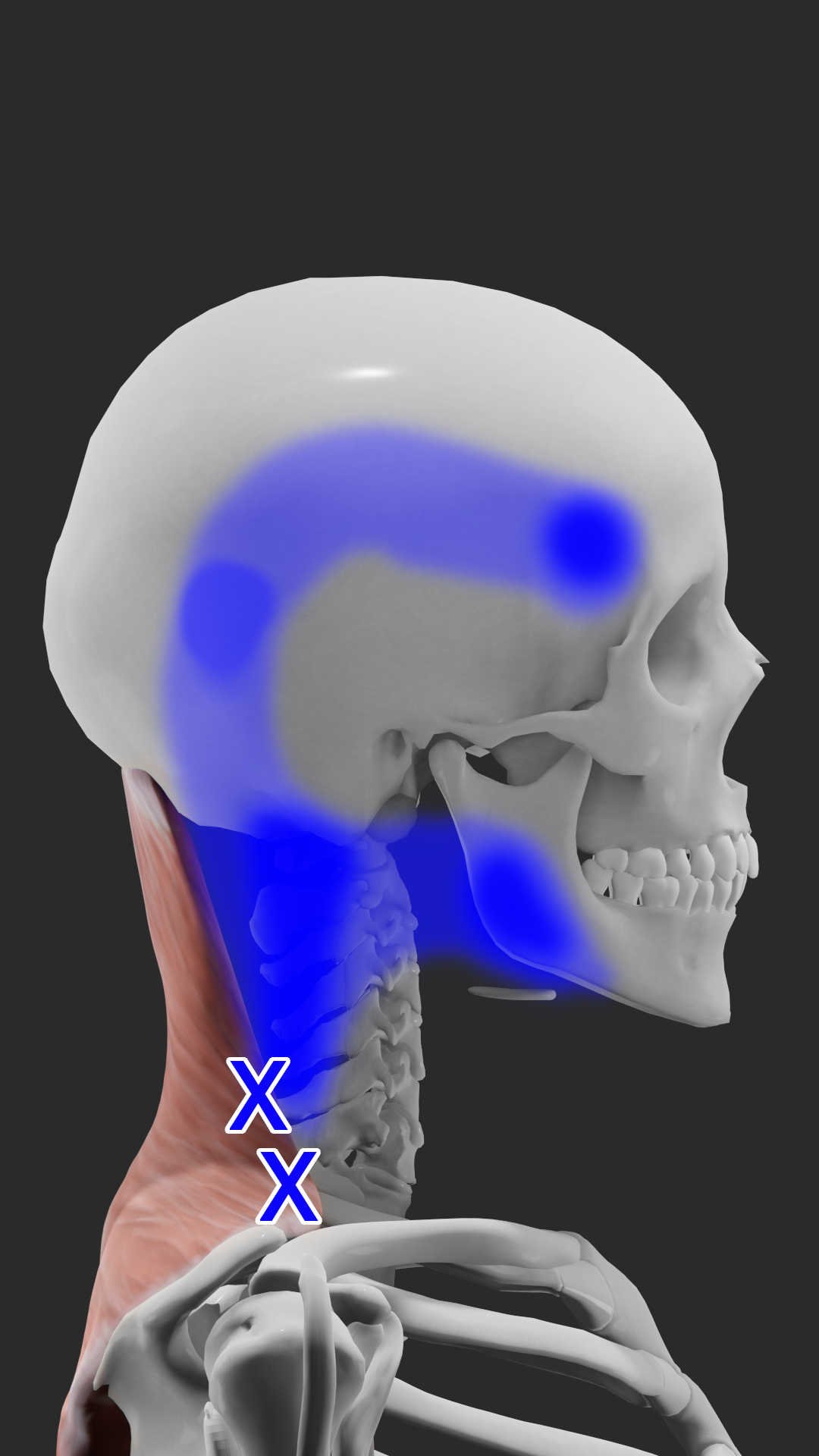
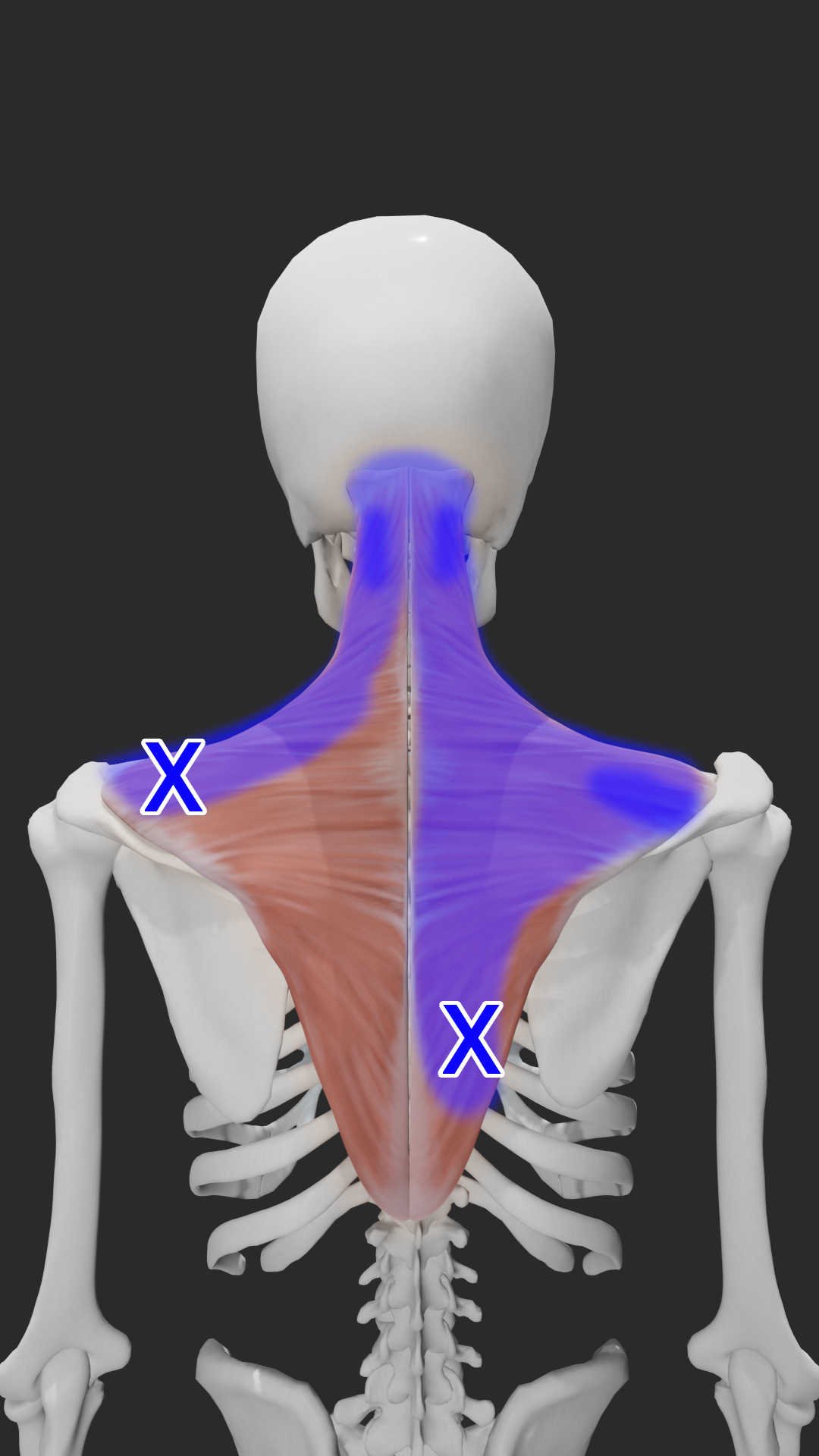
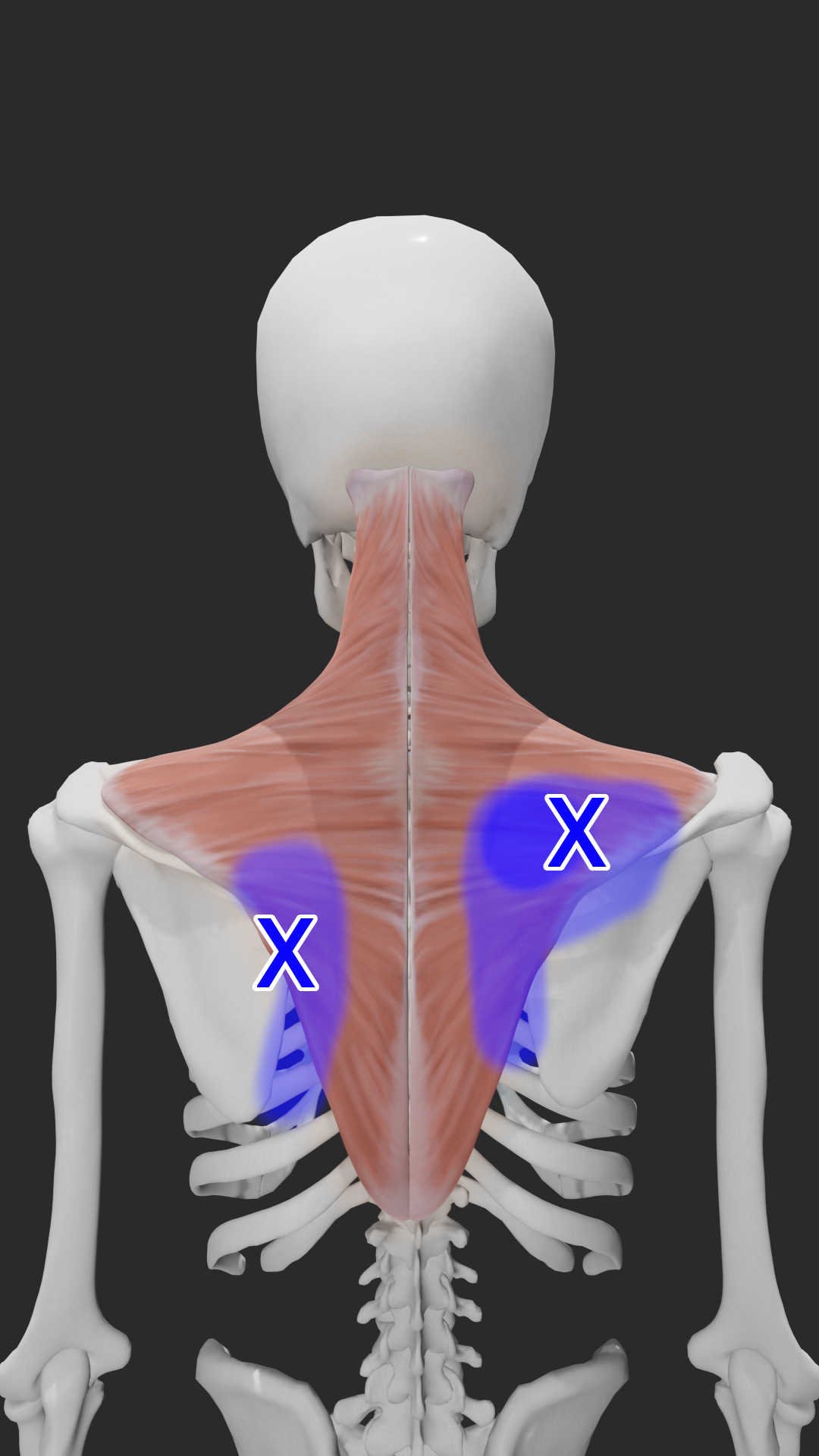
Differential Diagnosis for Trapezius Trigger Points
Trigger points of muscles of mastication (chewing)
Fibromyalgia
Related Trigger Points to Trapezius Pain
Levator scapulae
Masseter
Temporalis
Occipitalis
Pectoralis major/minor
Trapezius Treatment Options
Treatment for pain and tension in the trapezius muscle may include stretching and strengthening exercises, myofascial release, and trigger point therapy. Acupuncture and dry needling are effective methods for treating trapezius trigger points, as supported by various studies and literature.
What the Research Shows
There are numerous research studies that support the use of acupuncture and dry needling to treat trapezius trigger points and muscle pain. For instance, a study by Gerber et al. (2015) found that dry needling significantly reduced pain and altered the status of trigger points in the upper trapezius muscle. Another study by Turo et al. (2015) used ultrasound elastography to quantify muscle tissue changes after dry needling, further supporting its efficacy. Abbaszadeh-Amirdehi et al. (2016) also reported therapeutic effects of dry needling in patients with upper trapezius myofascial trigger points, emphasizing its immediate neurophysiological and clinical effects. Aranha et al. (2011) and (2015) explored the efficacy of electroacupuncture for myofascial pain in the upper trapezius muscle and found significant improvements in pain intensity and cervical range of motion. Lastly, a study by Garcia-de-Miguel et al. (2020) compared PENS with dry needling and found that PENS produced greater improvements in pain and disability in the short term.
Acupuncture and Dry Needling for Trapezius Trigger Points
Your acupuncturist will palpate for taut bands of muscle to find trigger points in the trapezius and then release them with an acupuncture needle. These trigger points can mimic a trapezius strain and be more intense than other trigger points in the body - especially the upper trapezius area. Trigger point dry needling for the trapezius muscles can release the trigger points and is one of the most effective ways to relieve pain in these muscles.
Final Thoughts
It's important to maintain good posture (both while awake and asleep), take frequent breaks when performing repetitive movements, and avoid carrying heavy bags on one shoulder to help prevent tension and pain in the trapezius muscle. If you're experiencing persistent pain in the trapezius area, consider acupuncture and dry needling as effective treatment options.
Over to you
If you liked this article, please share with friends and family who may be suffering with trapezius pain or tension headaches.
Sources:
Travell, J. G., Simons, D. G. (1993). Myofascial pain and dysfunction: The trigger point manual. London: Lippincott Williams & Wilkins.
Biel, A., & Dorn, R. (2010). Trail guide to the body: A hands-on guide to locating muscles, bones and more. Boulder, CO: Books of Dicovery.
Janda, Vladimír. “Muscle Function Testing.” (1983).
Ourieff J, Scheckel B, Agarwal A. Anatomy, Back, Trapezius. [Updated 2023 Mar 11]. In: StatPearls [Internet]. Treasure Island (FL): StatPearls Publishing; 2023 Jan-. Available from: https://www.ncbi.nlm.nih.gov/books/NBK518994/
Gerber, L., Shah, J., Rosenberger, W., Armstrong, K., Turo, D., Otto, P., ... & Sikdar, S. (2015). Dry Needling Alters Trigger Points in the Upper Trapezius Muscle and Reduces Pain in Subjects With Chronic Myofascial Pain. DOI: 10.1016/j.pmrj.2015.01.020
Turo, D., Otto, P., Hossain, M., Gebreab, T., Armstrong, K., Rosenberger, W., ... & Sikdar, S. (2015). Novel Use of Ultrasound Elastography to Quantify Muscle Tissue Changes After Dry Needling of Myofascial Trigger Points in Patients With Chronic Myofascial Pain. DOI: 10.7863/ultra.14.08033
Abbaszadeh-Amirdehi, M., Ansari, N. N., Naghdi, S., Olyaei, G., & Nourbakhsh, M. (2016). Therapeutic effects of dry needling in patients with upper trapezius myofascial trigger points. Acupuncture in Medicine, 34(5), 397–403.
Aranha, M. T. M., Alves, M., Berzin, F., & Gavião, M. (2011). Efficacy of electroacupuncture for myofascial pain in the upper trapezius muscle: a case series. Revista Brasileira de Fisioterapia, 15(5), 371–379.
Aranha, M. T. M., Müller, C., & Gavião, M. (2015). Pain intensity and cervical range of motion in women with myofascial pain treated with acupuncture and electroacupuncture: a double-blinded, randomized clinical trial. Brazilian Journal of Physical Therapy, 19(1), 34–43.
Coan, R. M., Wong, G., & Coan, P. L. (1981). The acupuncture treatment of neck pain: a randomized controlled study. American Journal of Chinese Medicine, 9(4), 326–332.
Tough, E. A., White, A. R., Cummings, T. M., Richards, S. H., & Campbell, J. L. (2009). Acupuncture and dry needling in the management of myofascial trigger point pain: a systematic review and meta-analysis of randomized controlled trials. European Spine Journal, 18(1), 3–18.
Disclaimer: This web site is intended for educational and informational purposes only. Reading this website does not constitute providing medical advice or any professional services. This information should not be used for diagnosing or treating any health issue or disease. Those seeking medical advice should consult with a licensed physician. Seek the advice of a medical doctor or other qualified health professional for any medical condition. If you think you have a medical emergency, call 911 or go to the emergency room. No acupuncturist-patient relationship is created by reading this website or using the information. Morningside Acupuncture PLLC and its employees and contributors do not make any express or implied representations with respect to the information on this site or its use.
